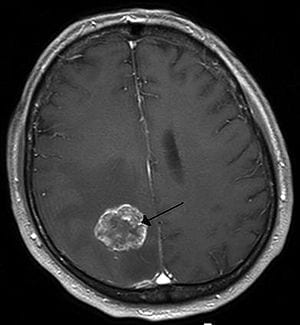
- Image via Wikipedia
Unique Triggering Device Delivers Antitumor Drugs
Nine years ago, scientists at Cedars-Sinai’s Maxine Dunitz Neurosurgical Institute detected a subtle shift occurring in the molecular makeup of the most aggressive type of brain tumors, glioblastoma multiforme. With further study, they found that a specific protein called laminin-411 plays a major role in a tumor’s ability to build new blood vessels to support its growth and spread. But technology did not exist then to block this protein.
Now, employing new drug-engineering technology that is part of an advanced science called nanomedicine, the research team has created a “nanobioconjugate” drug that may be given by intravenous injection and carried in the blood to target the brain tumor. It is engineered to specifically permeate the tumor cell wall, entering endosomes, mobile compartments within cells.
As endosomes mature, they grow acidic (low pH), and a chemical component of the drug triggers at this point, breaking the endosomes’ membranes. Freed drugs block the tumor cell’s production of laminin-411, the “malignant” protein of new tumor vessels. By its nature, the drug is nontoxic to non-tumor cells; side effects associated with conventional chemotherapy are not an issue with this class of drugs.
This approach is believed to be the first of its kind — the first application of a pH-dependent endosome escape unit in drugs administered intravenously for brain cancer treatment — as reported in Proceedings of the National Academy of Sciences(online). Studies in lab mice show this system allows large amounts of antitumor drug to accumulate in tumors, significantly slowing the growth of new vessels and the tumors themselves. Tumors in animals treated with the drug were 90 percent smaller than those in a control group.










